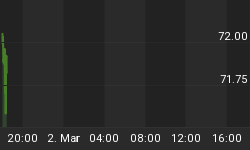There isn't a consistent relationship between gold and oil. In fact, the number of barrels of oil it takes to buy one ounce of gold tends to make huge swings -- from below 10 to above 25 and then back again -- and doesn't spend much time at all near its long-term average of 15. These huge swings are illustrated on the following sharelynx.com chart of the gold/oil ratio.
With respect to the current situation, the only reasonable conclusions we can draw from the historical performance of the gold/oil ratio are:
a) At the end of last August, in the immediate aftermath of Hurricane Katrina, gold was as cheap relative to oil as it has been at any time over the past 35 years, and although it has out-performed since that time it is still very cheap relative to oil.
b) Over the past 35 years there have, prior to last year, been 4 times (1976, 1982, 1990 and 2000) when the gold/oil ratio dropped into single digits. In each case the ratio rebounded to above 15 within the ensuing 2 years.

Now, just because markets performed in a certain way in the past doesn't mean they will perform that way in the future. It could be argued, for example, that there's been such a big change in oil's supply/demand situation that the gold/oil ratio will continue to move lower over the coming years.
Our view is that the gold/oil ratio made a major bottom last year and will, as a minimum, move up to 15-20 within the next two years. There are two main reasons for this.
First and as explained in previous commentaries, there is a lot of evidence that inflation expectations remain quite low despite the many obvious signs of an inflation problem. This suggests that few people appreciate the bullish case for gold -- gold has, we think, been pushed higher as part of a general commodity play rather than as a monetary play -- and, therefore, that the market hasn't yet begun to really discount gold's bullish fundamentals. On the other hand, is there anyone in the world who isn't well versed on the bullish case for oil?
Second, a sharply higher gold price would have no direct effect on commerce whereas a sharply higher oil price would hinder economic growth (and thus sow the seeds for a reduction in oil demand). A rising gold price might be perceived as evidence of an emerging inflation problem and might therefore create upward pressure on interest rates, but then again it might be possible for the media and the monetary authorities to explain away a substantial rise in the gold price as a reaction to geopolitical tensions, or China's growth, or gold buying by Arab sheiks, or falling mine supply, or something else unrelated to the true cause (inflation). The bottom line is that the gold price could rise to a multiple of its current level without making a significant difference to the economy (except to the extent that it affected inflation expectations), but the oil price could not do the same.















